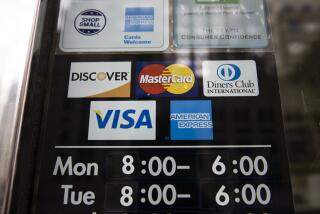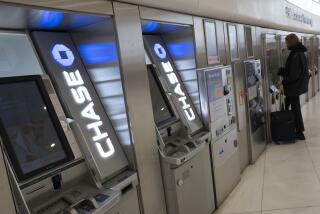Checking accounts still too confusing and expensive, study finds
- Share via
WASHINGTON — Despite recent improvements by the nation’s largest banks, checking accounts are still too confusing for consumers and overdraft fees are too high, according to new findings by the Pew Charitable Trusts.
Disclosures for checking accounts are too long, some fees for overdraft protection have increased and many consumers still are forced into binding arbitration to settle disputes with their bank, said the study released Friday by Pew’s Safe Checking in the Electronic Age Project.
“Consumers are expected to wade through long, confusing documents and may be subject to steep, unexpected fees to access their own checking accounts, the cornerstone of household financial management,” said Susan Weinstock, the project’s director.
“Consumers must have understandable, transparent information that enables them to make educated choices when comparing one checking account’s costs and benefits to another,” she said.
Pew called on regulators again to force banks to provide better disclosure and make overdraft fees proportional to the banks’ costs.
Nessa Feddis, vice president and senior counsel at the American Bankers Assn. trade group, criticized the report, saying many banks were “going the extra mile” to make sure that customers understood fees and disclosures.
She also said consumer groups had an unrealistic expectation that banks could simply break even on fees for services such as overdraft protection.
“We all want everything to be free,” she said. “For any business or any household to be successful, income has to be higher than expenses.”
The study is an update to the Pew project’s 2011 report, “Hidden Risks: The Case for Safe and Transparent Checking Accounts,” which raised alarms about fees and disclosures at the nation’s 10 largest banks.
This time, Pew looked at the practices at the 12 largest banks, as well as the 12 largest credit unions, in a follow-up report titled “Still Risky: An Update on the Safety and Transparency of Checking Accounts.”
Improvements in key areas have been minimal, said the new report, which compared the data from 2010 with new data collected in October.
The median length of bank checking account disclosures has decreased to 69 pages from 111 pages in the earlier report.
But the disclosures still are too cumbersome and important policies and fee information are not summarized in a “uniform, concise and easy-to-understand format that allows customers to compare account terms and conditions,” Pew said.
Pew found that financial institutions do not provide clear and detailed information about options for overdraft protection and their costs. Many banks and credit unions have three options with very different fees and features, but “consumers may not be aware of lower-cost options,” the Pew report said.
The median overdraft fee for large banks remains $35, the same as in the first report.
But more checking accounts now come with an extended overdraft penalty fee, which kicks in if the overdraft is not repaid in a timely manner. The median extended overdraft fee has increased 32% since the first report.
The report also said consumers still faced hurdles in settling disputes. Of the 237 checking accounts offered by the largest banks, 66% forced customers to submit any disputes to binding arbitration, down from 71% in the first report.
More to Read
Inside the business of entertainment
The Wide Shot brings you news, analysis and insights on everything from streaming wars to production — and what it all means for the future.
You may occasionally receive promotional content from the Los Angeles Times.











